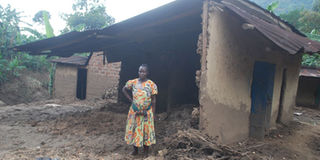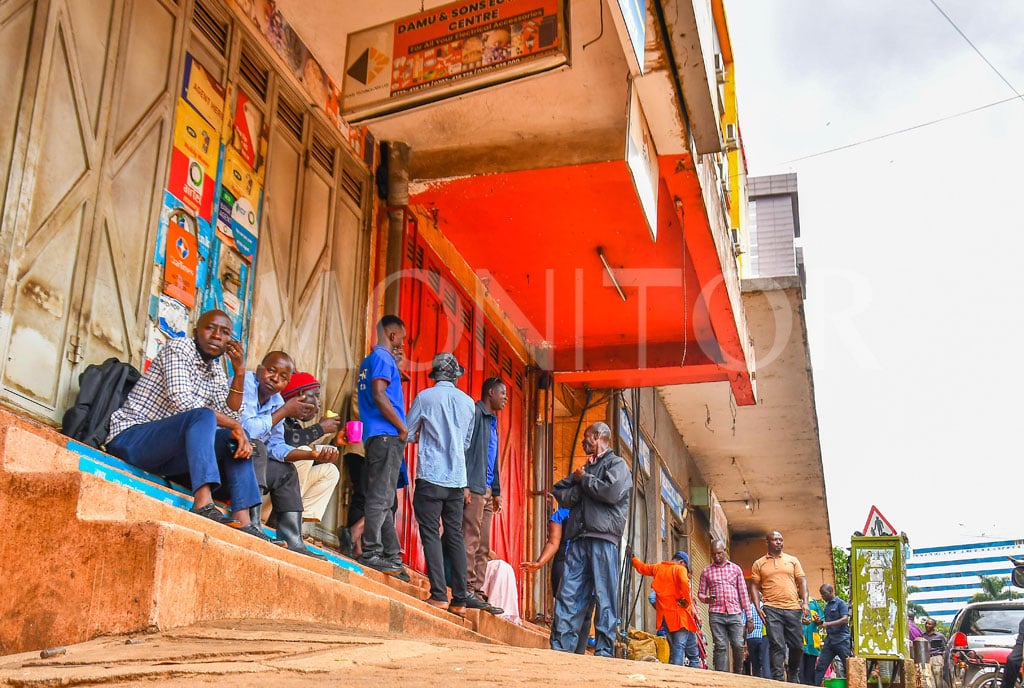Survivor watched helplessly as husband drowned in floods

Nandutu stands where their family house used to be. She says the floods destroyed everything that they owned. Photo by Micheal Woniala & Fred Wambede
What you need to know:
Nandutu watched helplessly as her husband was washed away by the raging waters. All she could do was scream, but unfortunately she was too late. She shares her story of living with the guilt that she was unable to save him, writes Micheal Woniala & Fred Wambede
“Whenever I think of what happened I do not want to eat or live anymore. I blame myself for not being able to save my husband,” says Aidah Nandutu.
Nandutu, 39, and her four children, sit quietly under a tree at Bukalasi Secondary School playground, holding grey cards. When she starts to speak in a hoarse voice, her children aged between six to 15 years look on pensively, clinging to her for protection.
“These are the coupons we use to get food and other relief items. As a family, this is the only thing we have left,” she says.
Nandutu lost her husband, John Kuloba, 50, following the devastating mudslides that hit the area on October 11. The disaster was triggered by heavy rainfall that forced River Tsuume in Tsuume village, Bukalasi Sub-county to burst its banks.
Nandutu, a resident of Wajenwa village, says the tragic event has shattered her life and that of her family and terribly altered the course of their lives.
“Although we did not have much, we were not as hopeless as we are today. My husband was a hardworking man who dearly loved his family,” Nandutu says, adding that she never knew that her husband would die so tragically putting an end to the numerous plans they had made.
The incident
On the fateful day, Nandutu says she was preparing her husband’s favourite meal of matooke and malewa, a local delicacy, when it started raining, gently.
“The rain started at around 11am and continued to 1pm, when it started pouring heavily. I was in the kitchen and my husband was inside the house listening to radio while the children were playing in the neighbourbood, some metres away,” she says.
Nandutu adds that after a few minutes, she heard people shouting that the river had flooded and it was washing away houses. “I ran out of the kitchen and started running towards the place where a number of residents had gathered to see what was happening. I saw running water with mud and stones approaching my house at a fast speed,” she says.
Nandutu says she tried calling her husband to run for his life but it was not possible. “I called him at the top of my voice to escape from the house but before he could move out, the water started washing away our house. He did not make it,” she says.
Nandutu adds that from where she was standing atop a hill, she watched in tears as flash floods reduced part of their house to rubble. When the waves calmed down at 4pm, her husband’s body was found floating on the river by residents.
Others, who had also died were also found with missing body parts.
Loss of property
The mudslide also buried Nandutu’s livestock, which included two cows, goats and household property, leaving the family with nothing to start with.
Being sheltered in the nearby mosque with her children, Nandutu says they are living in terrible conditions. “We now sleep on the verandah of the mosque and getting food is by luck yet we have to eat,” she says.
She says at night, apart from sleeping in the cold due to lack of blankets, they are bundled together with children. “We have no privacy, especially at night and no toilet facilities,” she says.
Going back
Like Nandutu, many of the victims who were relocated to the temporary camp at Bukalasi Secondary School playground have started returning to their respective homes, due to lack of shelter and food.
“They should provide for us food and shelter if they do not want us to go back to our homes but short of that, we have no option,” she says.
She adds that government and other developmental partners should support them with relief items including tents and urges the government to speed up the relocation and resettlement plan for the victims.
Background
Most victims of the October 11 mudslides were residents of Tsuume Village. Dozens of people were killed and more than 800 people were left homeless when River Tsuume flooded. Cabinet recently approved Shs32 billion to be used in the relocation and resettlement exercise of people living in landslide prone areas in Bududa District to Bulambuli District.
Mbale Municipality MP Jack Wamanga said the government is dragging its feet as far as resettlement of landslide victims in the sub-region is concerned.
“This government does not care about the people because if it did, it would not have waited for our people to die again after the Nametsi landslides,” he said.
The 2010 Nametsi landslides left more than 365 people dead and scores displaced.
Paul Kitongo, a survivor, said they welcome the relocation to safer places but it would be more helpful if they are relocated within the district because this can enable them to cultivate their land.
He said some people who were relocated to Kiryandongo District after the 2010 landslides returned home after failing to cope.
End of search
The government last week officially called off the search for people that were swept away by the devastating mudslides in the villages of Bakalasi Sub-County in Bududa District.
Martin Owor, the commissioner for disaster in the office of the Prime Minister, said they are now focusing on taking care of those that survived as well as families of those who lost their lives in the disaster.
By the time of calling off the search, 49 people had been confirmed dead.
The commissioner added that they had acquired a satellite video that shows the whole area of Bukalasi five minutes before it was washed away by floods.
He added that they are going to sit down with the locals from Bududa to look at house-by-house to confirm if the number of the people, both dead and alive marches with those that were there before the landslides.




